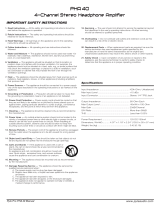
1 - Pyle Home PCM20A Manual
WARNING: To reduce the risk of fire or shock hazard, do not
expose this product to rain or moisture.
RISK OF ELECTRIC SHOCK
DO NOT OPEN
CAUTION: To reduce the risk of electric shock, do not remove
cover or back. No user-serviceable parts inside. Refer servicing
to qualified personnel.
This symbol is intended to alert you to the - 6 presence of un-
insulated dangerous voltage within the product’s enclosure that
might be of sufficient magnitude to constitute a risk of electric
shock. Do not open the product’s case.
This symbol is intended to inform you that important
operating and maintenance instructions are included in the
literature accompanying this product.
CAUTION
1. Read Instructions — All the safety and operating instructions should be read before the appliance is operated.
2. Retain Instructions — The safety and operating instructions should be retained for future reference.
3. Heed Warnings — All warnings on the appliance and in the operating instructions should be adhered to.
4. Follow Instructions — All operang and use instructions should be followed.
5. Water and Moisture — The appliance should not be used near water -for example, near a bathtub, washbowl,
kitchen sink, laundry tub,swimming pool, or a wet basement.
6. Ventilation — The appliance should be situated so that its location or position does not interfere with its proper
ventilation. For example, the appliance should not be situated on a bed, sofa, rug, or similar surface that may
block the ventilation openings: or placed in a built-in installation, such as a bookcase or cabinet that may impede
the flow of air through the ventilation openings.
7. Heat — The appliance should be situated away from heat sources such as radiators, heat registers, stoves, or
other appliances (including amplifiers) that produce heat.
8. Power Sources — The appliance should be connected to a power supply only of the type described in the
operating instructions or as marked on the appliance.
9. Grounding or Polarization — Precaution should be taken to insure that the grounding or polarization means of
an appliance is not defeated.
10. Power-Cord Protection — Power supply cords should be routed so that they are not likely to be walked on or
pinched by items placed upon or against them, paying particular attention to cords at plugs, convenience
receptacles, and the point at which they exit from the appliance.
11. Cleaning — The appliance should be cleaned only as recommended by the manufacturer.
12. Power Lines — An outside antenna system should not be located in the vicinity of overhead power lines or
other electric light or power circuits, or where it can fall into such power lines or circuits. When installing an
outside antenna system, extreme care should be taken to keep from touching such power lines or circuits as
contact with them might be fatal.
13. Nonuse Periods — The power cord of the appliance should be unplugged from the outlet when the appliance
is to be left unused for a long period of time.
14. Object and Liquid Entry —
Care should be taken so that objects do not fall and liquids are not spilled into the
enclosure through openings.
15. Carts and Stands — If the appliance is used with a cart or stand, the cart or stand should be a type
recommended by the manufacturer.
An appliance and cart combination should be moved with care. Quick stops, excessive
force, and uneven surfaces cause the appliance and cart combination to overturn.
16. Mounting — The appliance should be mounted only as recommended by the manufacturer.
17. Damage Requiring Service — The appliance should be serviced by qualified service personnel when:
A. The power-supply cord or plug has been damaged.
B. Objects have fallen into, or liquid has been spilled into the appliance enclosure.
C. The appliance has been exposed to rain.
D. The appliance has been dropped, or the enclosure damaged.
E. The appliance does not appear to operate normally or exhibits a marked change in performance.
18. Servicing — The user should not attempt to service the appliance beyond that described in the user’s
operating instructions. All other servicing should be referred to qualified personnel.
19. Overloading — Do not overload wall outlets and extension cords as this can result in a risk of fire or
electric shock.
20. Replacement Parts — When replacement parts are required, be sure the service technician has used
replacement parts specified by the
manufacturer or have the same characteristics as the original part.
Unauthorized substitutions may result in fire, electric shock or other hazards.
21. Safety Check — Upon completion of any service or repairs to this appliance, ask the service technician to
perform safety checks to determine that the appliance is in proper operating condition.
IMPORTANT SAFETY INSTRUCTIONS
















